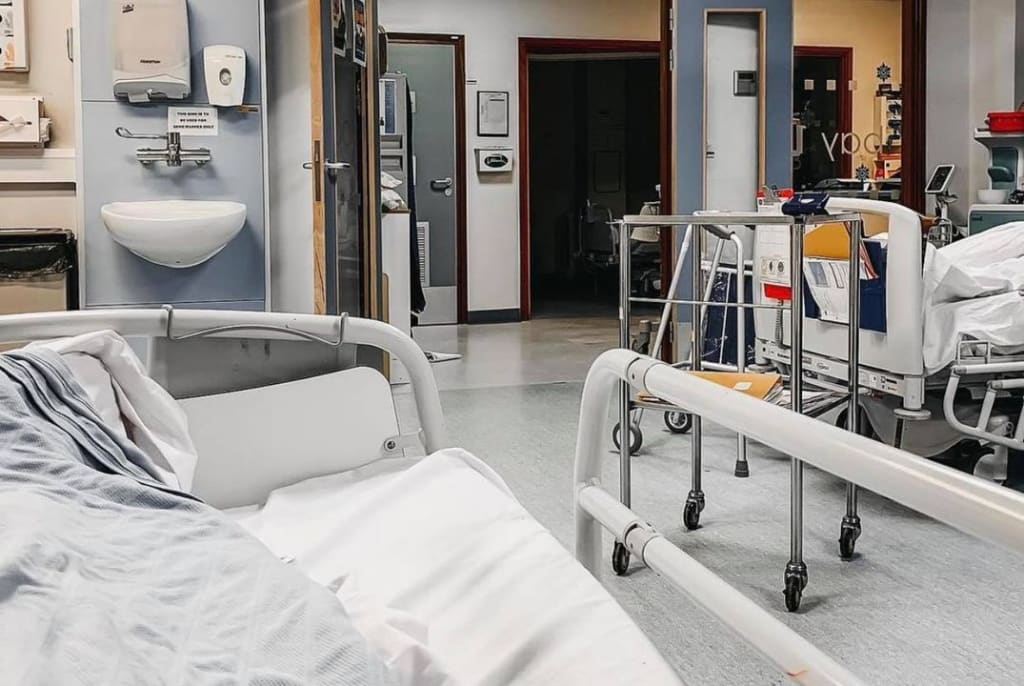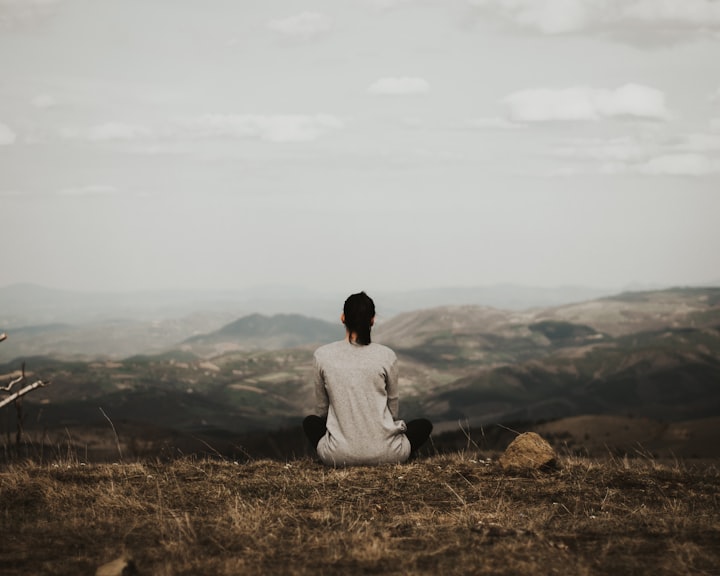Broken bones heal, but does our mental health?
Coming to terms with the impact orthopaedic trauma has had on my mental health.

Typically accident-prone
Ask anybody and they will tell you that broken bones aren't exactly a new thing for me. With my first break at 8-years-old, I got used to the routine of accident/break/X-Ray/temporary cast/permanent cast. This became my routine for the next couple of times - that's right, a couple of times *queue eye-roll emoji!*
One step too far
This was my routine until everything changed. On a fateful day in November 2019, I slipped on some leaves and broke my leg. I know, what a glamourous fracture story!
I was alone at the time, heading home, and all of a sudden I couldn't move. I am so grateful for the two passersby, who took the time to stop, call me an ambulance and make sure I was as comfortable as I could be, given the circumstances. Fortunately, one of the people that stopped was actually a nurse so they were able to look at my leg before the ambulance got there.
This being my first time in an ambulance definitely didn't help the trauma of the situation. One moment I was walking to get the bus home, the next, I'm laying in the back of an ambulance with morphine coursing through my veins as a paramedic tries to straighten my badly twisted leg.
I can tell you one thing, by the time I got to the hospital I was slightly delirious on pain relief. I have vague memories of laughing at stupid things. My mum stroking my hair, telling me it was going to be okay. Emergency X-Ray. The radiographer straightening my leg for the X-Ray. Then darkness.
After the X-Ray, when I came to, I remember mentally going through my, once familiar, routine again. It was very obvious to me that I'd broken my leg, the pain felt familiar. I figured that I'd get my temporary cast with a set of crutches and I would be at work the following day. How wrong I was.
The reality of the situation
The reality was my oh so familiar routine wouldn't cut it this time. The consultant came in with my results and told me that I had sustained a spiral fracture to my tibia and a cracked fibula. With the tibia being the hardest bone to break in the body - I can say that I definitely don't do things by halves!
Instead of a temporary cast, all of a sudden, I had to accept the reality that I would need internal fixation surgery and I would need to be in hospital at least until I could have the surgery.
Two days later, the surgery was complete and my leg was bandaged from my toes to my thigh! My memory from of those two days is fuzzy at best. A lot of pain relief and ward changes.
From then my journey of learning to walk again began. It was painful, frustrating, gruelling, and far from over. I have come a long way over the past year and a half, but I'm still not fully recovered.
Instead of the cast that I thought I would get, I got surgery, two weeks bed-bound in hospital, a month being wheelchair-dependent, three months on crutches, three months in hydrotherapy, three months using a stick and a year (and counting) of physiotherapy. This was definitely not what I thought would happen when I was laying in that hospital bed all those months ago.
Losing my independence
In one slip I completely lost my independence. I was bed-bound, I couldn't even lift my leg. I was dependent on others to help me with personal care and I hated it. This was particularly hard for me to accept as I have a background in healthcare. I have spent years helping people with their personal care, so when it came to me being the one needing help, it was difficult to wrap my head around.
After two weeks of struggling to walk to the ward toilet, I met the requirements to leave hospital and go home. I missed my bed. I missed cuddles with my cat, Lunar. Most of all, I missed being around my family.
House adjustments with occupational therapists were arranged and pain medication collected, I was finally cleared to go home. From spending years studying in the health sector, I had thought of everything. At least that's what I thought...
I got out of the car, headed down the path that I had walked down so many times before, to find.... a step. The one obstacle that I had forgotten I needed to face and with that one step, I felt defeated all over again. I felt what little independence I had managed to regain, slipping away again - no pun intended!
Just as I felt things were starting to improve this 10-inch step had beaten me. The pain was devastating. I just wanted to be able to do basic things again.
My mental health during physical recovery
While I was in hospital, I was forced to reevaluate my mental health. I started struggling with my mental health from the age of twelve and there was a lot of darkness during my teenage years. Between depression, anxiety, OCD and self-harm, it took several years for me to get in a good place and find coping mechanisms that work for me.
Over the years I settled on three coping mechanisms:
- Throwing myself into my career
- Going to town with my fitness at the gym
- Travelling and experiencing new things
After realising I physically couldn't do any of my coping mechanisms, I knew my mental health was going to suffer. I felt that, all of a sudden, everything was out of my control and it really got to me.
Depression engulfed me in a very familiar way and my old habits came back to haunt me. Even with three years clean of self-harm, I found myself feeling triggered in a way I had never felt before and I didn't know how I could stop it.
Little by little I began to regain my independence and just as I started my transition from crutches to a stick, so I could get back to work, everything came to a halt.
There was an announcement in the news... Prime Minister Boris Johnson called for an immediate national lockdown. That's right, the coronavirus pandemic, which we've all grown to know so well, had brought the world to a stand-still. I actually remember the rumours of coronavirus from when I was in hospital. It was being talked about but nobody realised just what it would become.
Facing new challenges with my mental health
It's been almost a year and a half since I left hospital and I'm still not okay. The last time I met with my trauma and orthopaedic consultant I was told that I have scar tissue damage in my knee; a side effect of the internal fixation surgery. The consultant told me to "massage my scars until you cry" and dismissed me to wait for a follow-up appointment in six months time. It's now been a year.
Understandably things have been backlogged and I recognise I'm not the only one frustrated with physical recovery. I am still in contact with people who I met in hospital that are in similar situations to me.
During the pandemic, it very much felt like going through the motions. I can tell you that physio phonecall appointments are not fun. It is hilariously frustrating to have a phone to your ear as you are bending your body in painful ways all in the name of physical rehabilitation. I tried my best to keep fit during the lockdowns but was still limited by this pesky scar tissue damage.
At this point, I've accepted that I'm in a sort of limbo with my recovery at the moment and I live with the pain as best I can and I thought I was okay, until I wasn't.
A couple of weeks ago, I'd finished cleaning the house and went to put the cleaning supplies away, I slipped. That's right, I slipped. In that moment, I was back in hospital again, morphine coursing through my veins, bed-bound and completely dependent on other people again. I was on the kitchen floor and I couldn't move. A wave of anxiety consumed me and I felt broken. Not physically, but mentally. I had felt anxious before when I was in situations similar to when I broke my leg, but this was different. This time I actually fell. In that moment, all I could think of is how I couldn't go through that again. I couldn't go through the complete loss of independence, the surgery, the struggle of walking again, the pain. I could not do it.
I have lived with anxiety before but this wasn't like anything I'd ever experienced and that scared me - I don't know how to deal with this. I'd worked with several mental health charities over the years so I understood what was happening. The flashbacks, the anxiety, the panic attacks, the depression. It was post-traumatic stress disorder. At first, I didn't want to accept it, I belittled and dismissed what I was feeling. I told myself that I couldn't possibly have PTSD because people have been through far more traumatic things than breaking a leg - but I was wrong.
After a bit of curious research, I was surprised to find that it's not uncommon for people developing PTSD as a result of orthopaedic trauma. Something that I hadn't thought of before.
When inspiration strikes
Believe it or not, Netflix inspired me to write this piece. Recently, I have been watching "The Bold Type" - a series about three women navigating NYC while working for a fashion magazine. With all the typing going on in these episodes, I felt the urge to do some typing of my own.
In recent years I have felt very open and able to talk about my own mental health, and despite being quite self-aware, it turns out I am still on a journey of learning about my own mental health.
This whole experience has really tested me in ways that I could never have imagined and despite being far from okay right now, I feel like this is part of my healing progress. I hope that this gives people a chance to stop and consider what they think PTSD is and open a conversation to eliminate the stereotypes surrounding this hidden struggle.






Comments
There are no comments for this story
Be the first to respond and start the conversation.